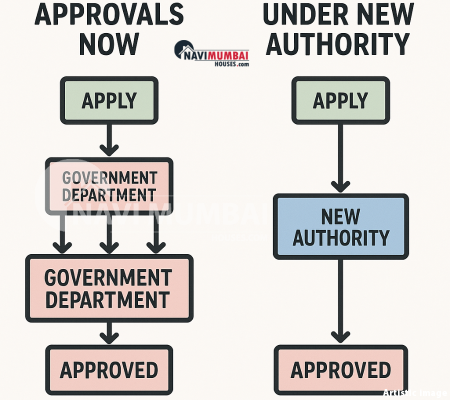
Redevelopment in Maharashtra—particularly in Mumbai and its suburbs—has historically suffered from fragmented oversight, slow approvals, legal disputes, claims of unfair practices, and inconsistent regulation.
-
Many housing societies and cooperative groups struggle with multiple authorities (municipal corporations, MHADA, RERA, SRA, etc.) to get clearances.
-
Disputes between developers and societies over obligations, floor space, costs, and delays are common.
-
Lack of a unified authority leads to opacity in development agreements, approvals, documentation, and enforcement.
-
Some redevelopment projects languish; public trust suffers.
This regulatory complexity and slow pace discourage self-redevelopment and make society-led redevelopment riskier.
What Happens Without Reform
Because of the current state:
-
Societies may avoid redevelopment altogether, leaving buildings unsafe or outdated.
-
Developers must navigate a maze of approvals, increasing cost, delay, and risk, which often gets passed to homeowners.
-
Disputes often reach courts, dragging on years, eroding trust and incurring legal costs.
-
Quality, safety, and accountability may suffer, reducing the credibility of redevelopment among citizens.
Homeowners are less likely to volunteer for self-redevelopment if uncertainties are high.
What the New Authority Could Do / What’s Planned
Several reports and recent government moves suggest Maharashtra plans to introduce an independent redevelopment oversight authority. This authority would:
Standardize Development Agreements & Drafts
It would create model agreements, checklists, and templates to reduce ambiguity and prevent unfair clauses.
Coordinate Multiple Approvals Under One Umbrella / One-Window System
It could streamline clearance from different municipal, urban, environmental, and infrastructure agencies.
Resolve Disputes / Act Quasi-Judicially
A mandate to adjudicate conflicts between societies and developers or authorities directly, without long court battles..
Oversight Across Project Lifecycle
From plan approvals, monitoring construction, ensuring compliance with safety, deadlines, and handing over possession.
Facilitate Finance / Loans / Guarantees
The authority may tie in with public financing support, guarantee credit approval processes for societies/redevelopment ventures.
Separate Law / RERA-like Regulation for Redevelopment
Since redevelopment projects are somewhat outside traditional RERA scope, the new authority may operate under a redevelopment-law framework or special law.
Transparency & Accountability
Regular disclosures, audit of projects, standardized public access to project status, and ensuring that promises made by developers are honored.
Impacts & Benefits (for Stakeholders)
For Housing Societies / Homeowners
-
More confidence in self-redevelopment (not needing to always rely on large builders).
-
Faster approvals, fewer legal delays, better control over developer obligations.
-
Protection against unfair clauses / hidden costs.
-
Higher safety and quality assurance through oversight.
For Developers & Consultants
-
Predictable and standardized processes — less uncertainty & less time lost in ambiguity.
-
Model agreements reduce negotiation costs.
-
Reduced litigation risk.
-
Better environment for credible, transparent projects.
For the Real Estate Ecosystem
-
More redevelopment activity, especially in older nodes.
-
Enhancement of urban renewal, safety, and quality of living.
-
Boost in supply in inner suburbs that are under redevelopment potential.
-
Boost to investor and buyer confidence.
Challenges & What to Watch
| Challenge / Consideration | What to Watch / Mitigation |
|---|---|
| Jurisdiction & Powers | The authority must clearly define its power vis-à-vis municipal bodies, MHADA, RERA, etc. |
| Transition & grandfathering of existing projects | How will ongoing redevelopment projects be handled under the new regulatory regime? |
| Resource & staffing | A strong, independent body needs skilled staff, expertise, and capacity to act effectively. |
| Legal mandate and law | If a separate law is required, the legislative process must be smooth, with stakeholder consultation. |
| Resistance from existing agencies | Some municipal or local authorities may resist ceding powers. |
| Ensuring speed + fairness | The authority must balance rapid processing with careful scrutiny. |
Also, society consent, transparency, funding, financing, and cost-sharing frameworks will need redefinitions in many redevelopment plans.
Takeaways
The proposal to establish an independent redevelopment oversight authority in Maharashtra is a bold, necessary step. It promises to bring coherence, transparency, speed, and accountability into a domain currently mired in fragmentation and delays.
For housing societies and homeowners, this could open the path to safer, more controlled self-redevelopment. For builders and professionals, clearer regulations and standardized processes reduce ambiguity and legal risk. Most importantly, this reform has the potential to revive urban renewal across Mumbai’s suburbs, offering better quality, safer homes, and modern infrastructure.
If implemented well, Maharashtra’s new authority may set a benchmark for urban redevelopment regulation across India.
Visit Us: navimumbaihouses.com or Call on @ 8433959100
The post Maharashtra’s Proposed Redevelopment Authority: Boosting Transparency & Accountability appeared first on .

